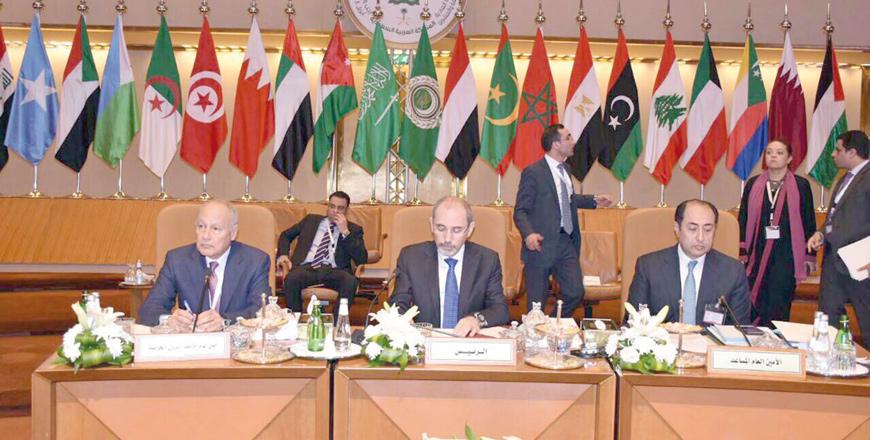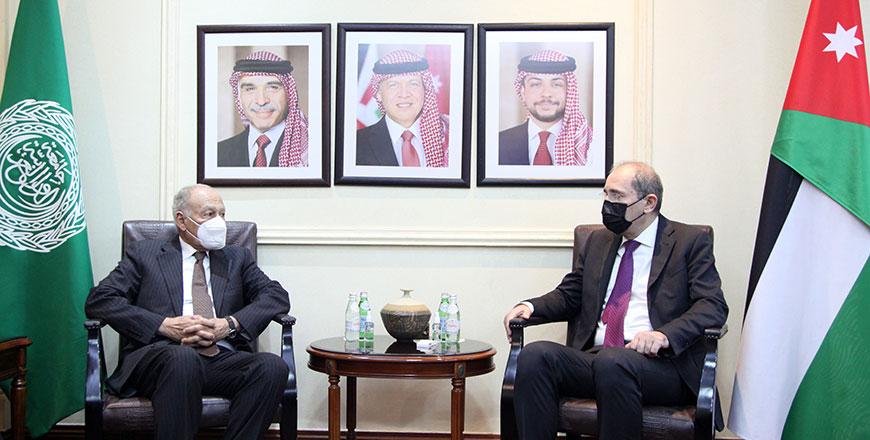You are here
Window narrowing for solution to Mideast conflict — FM
By JT - Apr 12,2018 - Last updated at Apr 12,2018

Foreign Minister Ayman Safadi opens the Arab Foreign Ministers Preparatory Meeting of the Arab Summit in Riyadh on Thursday (Petra photo)
AMMAN — Foreign Minister Ayman Safadi on Thursday said that the window for a solution to the Palestinian issue is narrowing, thanks to the Israeli occupation’s policies that are making peacemaking increasingly difficult.
He made his remarks as he presided over the Arab League’s foreign ministers meeting that met in Riyadh to prepare for the leaders summit on April 15, where he handed over the meeting’s presidency to his Saudi counterpart Adel Al Jubair.
Safadi said that chances of solving Arabs’ central issue, Palestine, are becoming increasingly weaker as the Israeli occupation is moving ahead with its illegal practices that undermine efforts to implement the two-state solution, the formula accepted by Arabs and the entire world as the only means to realise comprehensive and permanent peace, he pointed out.
Peace is Arabs’ strategic choice, he added, and the road towards peace is clear as stated in the Arab Peace Initiative: Ending the occupation and establishing an independent Palestinian state with East Jerusalem as its capital within the pre-1967 lines.
On Jerusalem, he said that His Majesty King Abdullah, the custodian of its Muslim and Christian holy sites, has always stressed it is a red line. The city has to be a symbol of peace rather than a place of despair, Safadi told his peers.
Meanwhile, the top diplomat stressed that the Arab League is the only framework for joint Arab action geared towards solving crises, conflicts and divisions in the Arab world.
Safadi said that the Arab summit is held at a difficult time, where challenges snowball, risks increase and the confidence of Arab peoples decline in efforts undertaken to address the region’s woes.
Arabs can face these challenges through restoring the momentum to their joint action, the minister said, as cited by the Jordan News Agency, Petra.
Joint efforts can end the Israeli occupation, stop civil wars and their devastating repercussions, address poverty and defeat ignorance and dark ideologies, especially that all Arabs are paying the price of the current situation in the neighbourhood, he added.
In his speech, Safadi expressed condolences to the Algerian people over the loss of lives in the Wednesday crash of a military plane.
He also condemned the Houthi missile attack on Saudi Arabia on Wednesday, expressing Amman’s support for Riyadh.
Arabs have to resume efforts to end the crisis in Syria, where the solution cannot be reached through military force. Arabs have to join efforts to reach a political solution, as they are the most affected by the crisis’ repercussions and have to take the lead in endeavours to bring the crisis to a halt.
It is also necessary to join efforts to stop the fighting and support Geneva talks to reach a political solution based on the UN Resolution 2254, which calls for preserving the unity of the country, he added.
Meanwhile, Safadi said that terrorism is Arabs’ common enemy that clashes with their values of peace and respect for others.
The minister added that the Kingdom is committed to continued contribution to the war on terrorism through full partnership with Arab players and the international community to safeguard pan-national security and the rights of Arabs to live in safety and stability.
Throughout its presidency of the Arab summit, Jordan has been busy in efforts to activate joint Arab action to serve common interests and overcome crises, according to the minister, who said His Majesty is leading relentless efforts in coordination with Palestinians and Arabs to ensure justice for Palestinians.
Similar efforts have been exerted to reach a political solution in Syria, end the crisis in Yemen in line with UN Security Council Resolution2216, and arrive at a national consensus in Libya that guarantees a better future for the country and its people, Safadi noted.
In his remarks, Jubeir denounced the US recognition of Jerusalem as the capital of Israel, praising the international consensus in rejecting the step, which, he said, would hinder efforts to reach a solution for the Arab-Isralei conflict.
The Saudi diplomat said that Iran and terrorism are inseparable, noting that it was Tehran that supplied the Houthis in Yemen with more than 117 ballistic missiles to launch them against Saudi cities.
For his part, Secretary General of the Arab League Ahmed Aboul Gheit said that the Iranian interference is a source of concern for all Arabs, adding that “neighbours should know that when it comes to threatening Arab lands or the sovereignty of states, Arabs will have unified voice and action”.
In regard to the Palestinian issue, Aboul Gheit said that the issue is facing serious challenges represented by the US unilateral and illegitimate decision to recognise Jerusalem as capital of Israel and to relocate the US embassy from Tel Aviv to the holy city.
On the sidelines of the ministerial meeting, Safadi met separately with UN Envoys to Staffan de Mistura and to Libya Ghassan Salame.
During the meeting, Mistura stressed the need to form an independent committee to investigate the reports on the chemical attacks in Syria recently, stressing that there must a response to such heinous attacks.
For his part, Salame outlined the latest developments in the Libyan crisis, noting intentions to hold municipal elections toward the end of April.
He also said that after Ramadan, a national forum would be held to allow the Libyan people to determine the future of their country.
Related Articles
AMMAN — Foreign Minister Ayman Safadi on Sunday said that all Arab states want an end to the Syrian crisis so that Damascus can restore its
AMMAN — Deputy Prime Minister and Foreign Minister Ayman Safadi and Arab League Secretary General Ahmed Aboul Gheit on Wednesday held talks
AMMAN — His Majesty King Abdullah on Tuesday received an invitation from Saudi King Salman Bin Abdulaziz to participate in the Arab summit s












